Life after detention: The hidden trauma signs still haunting Bilo girls
After a David and Goliath battle, the Tamil family are settling back into their ‘dream’ life in the Queensland town of Biloela but the years of trauma locked in a detention centre are still heartbreakingly evident for the young children.
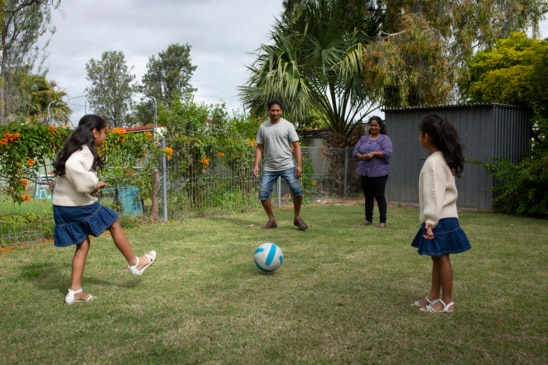
QWeekend
Don't miss out on the headlines from QWeekend. Followed categories will be added to My News.
In a storage cupboard in the carport of their rented three-bedroom brick home, boxed in Australia Post packaging, thousands of handwritten letters and cards are a legacy of the epic battle of Australia’s most famous asylum-seeking family.
The Nadesalingam family – Nadesalingam Murugappan (Nades), 45, Kokilapathmapriya Nadesalingam (Priya), 46, and their daughters Kopika, 7, and Tharnicaa, 5 – are back in Biloela, 120km southwest of Gladstone in Central Queensland, after being granted permanent residency, following more than four years of immigration and community detention in Melbourne, Christmas Island and Perth.
The family’s removal from their rented home in Biloela by Australian Border Force immigration officers and Serco guards in a 5am raid on March 5, 2018, one day after Priya’s bridging visa expired, sparked outrage from the community and set in motion a battle of David and Goliath proportions – of a small regional town against the might of the federal government.
A determined group of friends of the family – led by social worker Angela Fredericks – spoke out about the family’s treatment. The Sri Lankan Tamil family, who had lived in Biloela for more than three years, who had worked and contributed to the economy and whose daughters had been born in the town, became the face of a national “Home to Bilo’’ campaign.
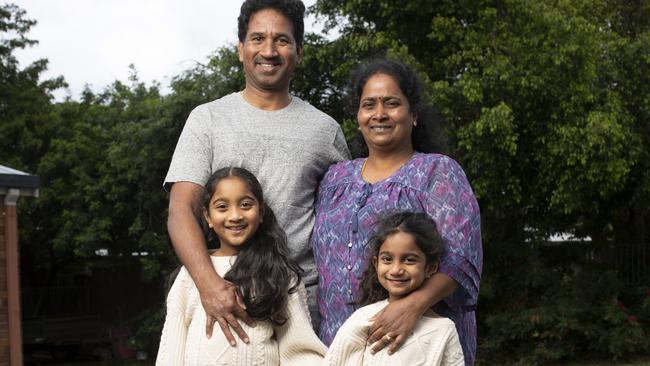
This crusade to save the “Biloela family’’ ultimately gathered almost 600,000 petition signatures of support and crowdfunded $765,555 that was used to pay for more than half a million dollars in legal fees, as well as billboard and newspaper advertisements. The relentless campaign humanised the image of an asylum seeker for many Australians.
It shouted loud and long about the conditions the family faced in their various forms of detention – how guards checked on them at night as they tried to sleep in their beds; how Priya could not breastfeed her baby without a guard watching; how toilet doors had to be kept open; how the screaming girls were separated from their mother and held by immigration officers during a deportation attempt; how Kopika began biting herself and pulling her hair from anxiety; and how very sick Tharnicaa became before she was eventually flown to a Perth hospital for treatment for pneumonia and blood poisoning.
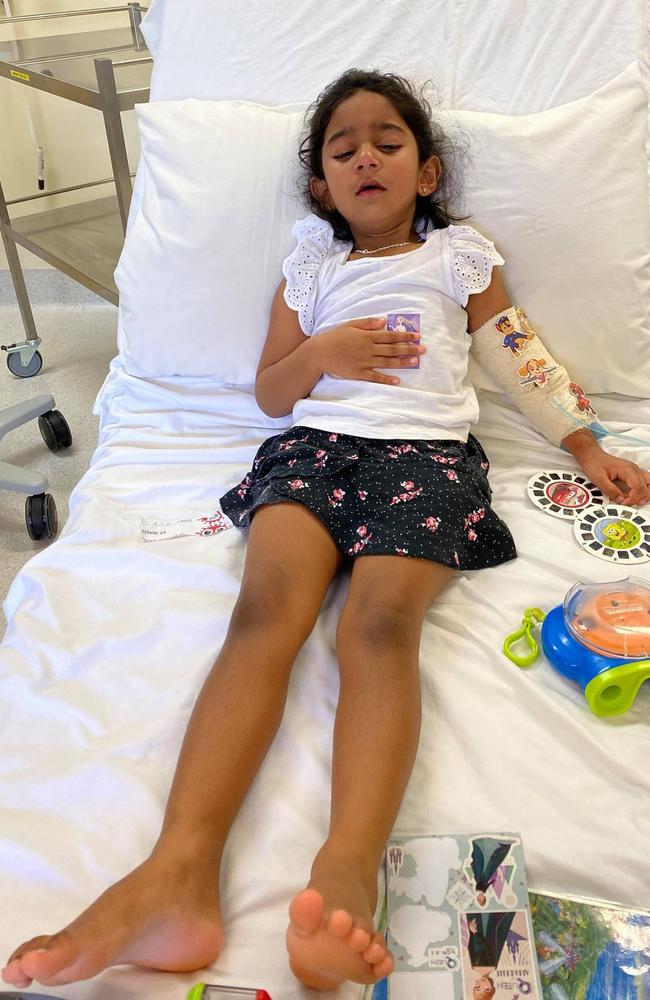
The family was twice put on planes to be deported to Sri Lanka – the first time a week after their removal from Biloela when they were flown from Melbourne to Perth and then boarded on to another plane. A last-minute legal injunction saw them removed from the aircraft and returned to Melbourne.
The second deportation attempt, in August 2019, saw the family forced on to a plane in Melbourne that was chartered for their removal and had no other passengers on board.
A legal injunction received while the plane was in the air but not yet out of Australian airspace saw them diverted to Darwin and then transported to detention on Christmas Island where they were the only inmates of the facility for almost two years.
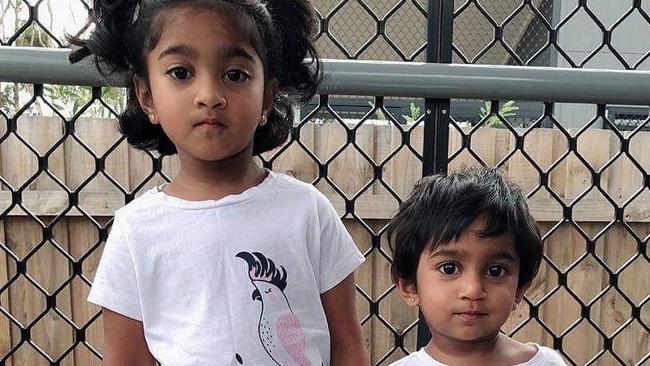
In 2021, the Morrison government’s Department of Home Affairs, responding to questions on notice in the Senate, stated the cost of the family’s detention on Christmas Island alone, from August 2019 to January 2021, was $6.7m.
And so, with information about the family’s plight kept on the Australian public’s radar by their Biloela friends-turned-activists, the letters and cards sent to the family kept coming.
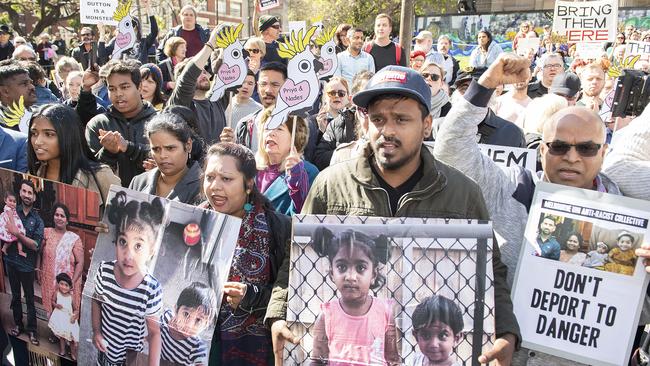
The mountain of correspondence to them over four years is filled with words of sincere support from people across Australia, sending hope and wishes that the family’s detention and uncertainty would end and that one day they would indeed be allowed to return to “Bilo’’. Often, parcels included gifts for the family or presents of clothing or toys for the girls. And while all were appreciated, it was the accompanying notes that Priya held dear.
During her family’s detention, when Priya experienced intense stress and crippling anxiety for her family’s safety, in dark periods when she was enveloped by depression and hopelessness, these kind, heartfelt, compassionate words, written and sent to her family by everyday Australians from all corners of the country, kept a spark of hope alive.
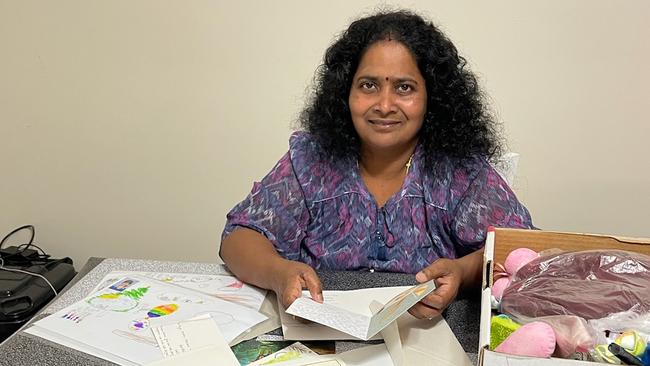
When the Nadesalingam family was finally given permission in May to return to Biloela on a bridging visa (and soon after granted permanent residency), it was not an option for Priya to throw those treasured words away. These letters are her reminder of an Australia that cared about what happened to her family.
They also tell a story she will share with her daughters when they are old enough to know.
She will show them the hundreds of thousands of words written to them, the words that wish them a happy Australian life, that beg common sense and human decency to prevail, that show just how many people stood in their corner.
And her daughters will understand their story of how they came to be living safely and peacefully in Australia, in their regional Queensland town, in the community they now call home.
In May, a newly elected Anthony Albanese’s Labor Party fulfilled a pre-election promise to allow the family to return to Biloela on bridging visas.
On June 10, the family finally set foot back in the town, in perfect time for the town’s June 11 Flourish multicultural festival that celebrates some of the 21 different nationalities who live in the area. The celebrations continued for Tharnicaa’s fifth birthday – her first outside of detention – on June 12.
Then on the afternoon of August 5, the family was visited by two Department of Home Affairs officers who, with some paperwork and a phone call confirming ministerial intervention, finally granted the family permanent residency.
It had been the news they had been waiting so long to hear but for Priya, the experience was more surreal than joyous. The ordeal of the past 4½ years has been so great and her mind so “lost’’, Priya says she was initially “numb’’ at the news.
“I was happy but my heart was numb,’’ Priya says. “Melbourne (detention) was a hard time. Deportation is a very tough time. Never will I forget in my life. I pray I forget this past life but no … sometimes, I remember again.
“Now I know it is real. Now Bilo is my home. It is a dream (to be) back to Bilo. I will stay here. No moving. My life is saved, my girls (are) safe, happy. My girls (will) have good education. I will teach my girls to help other people.’’
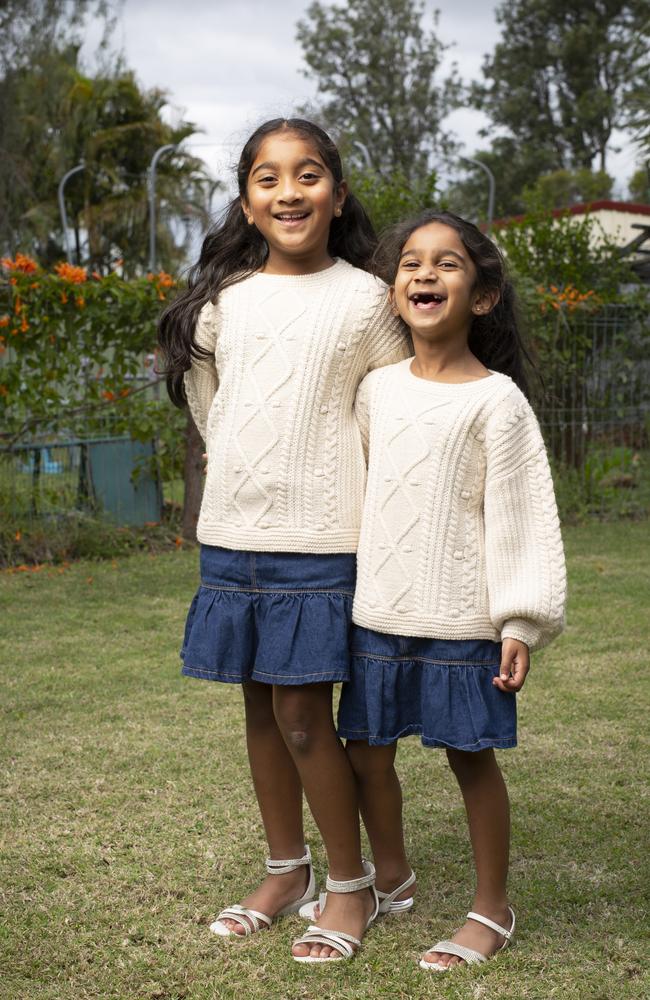
To Kopika, the Home Affairs officers in her house signified danger. Fredericks, who has been by the side of this family the whole way, saw Kopika quietly go to her room during the August 5 meeting.
“Kopika just disappeared and took herself to bed,’’ she says. “She was scared because every time that there had been a meeting or officers had come to see the family, something big happened.’’
There are other signs of their trauma too. Tharnicaa became inconsolable at the idea of a week-long holiday for the family in Brisbane during the June-July school holidays. She thought they were leaving Bilo and not returning because, in her short life, she has no memory of leaving a place and then returning.
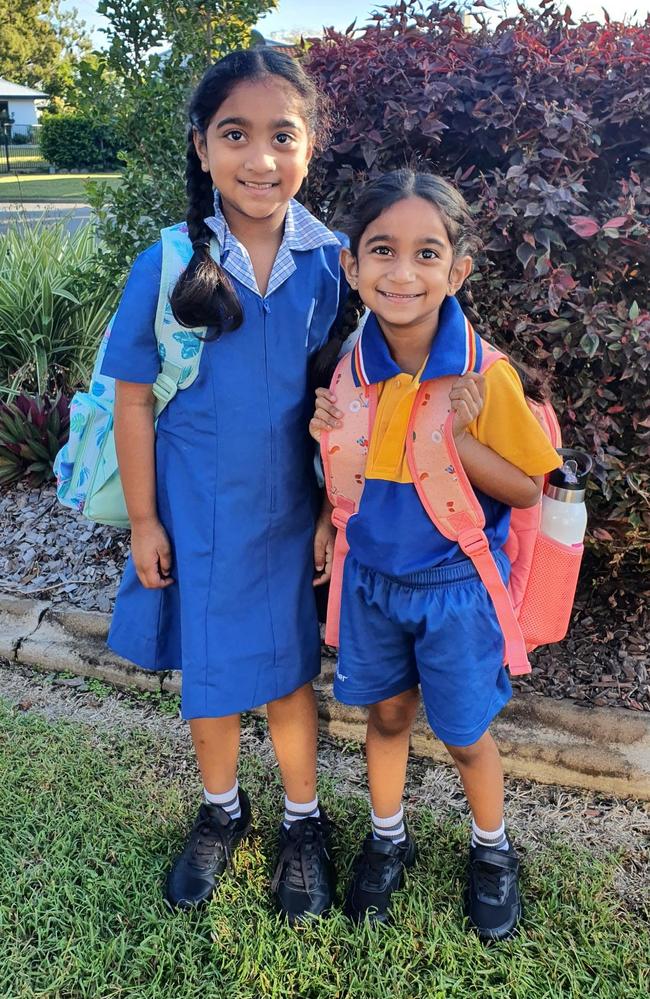
Today, living in their modest patch of suburbia, with its backyard brick barbie, Hills hoist and mango tree, Priya, Nades, Kopika and Tharnicaa are relishing their freedom, knowing they can finally call Australia home.
On the day of Qweekend’s visit to their Biloela home, Priya and Nades warmly welcome us with a cup of homemade masala chai. There are soon also plates of delicious Sri Lankan fish cutlets and freshly baked banana bread.
The family is settling into their new, permanent Australian life with the girls attending Biloela’s Redeemer Lutheran College – Tharnicaa in prep and Kopika in Year 2 – chosen because of the stability of its prep-to-Year 12 program. The family has been embraced by the school community where they have arrived at shared morning tea events armed with plates of food. Redeemer Lutheran College principal Eureka Coetzee says the girls have settled in, have made friends and are doing well.
“These girls are so resilient and accommodating to the Redeemer way, it seems as if they have been here forever,’’ she says.
“They are very social, always laughing and participating in activities with zest. They are also very capable students and the teachers are frequently commenting on their excellent manners.’’
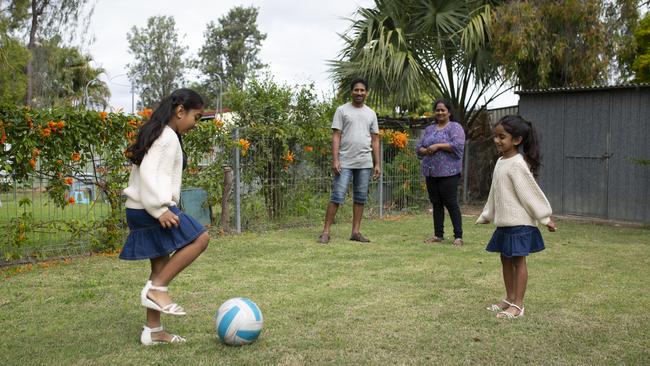
Priya is enrolled in English lessons at the local TAFE and Nades has a job with his former employer, Teys meatworks, working night shifts – from 3.30pm to 1am – which allows him to drop off and pick up the girls at school.
Priya is also planning to get her driver’s licence.
As a talented seamstress who makes many of her daughters’ clothes, Priya has dreams to sell her creations at local markets.
And both Priya and Nades plan to use a food van operated by Gladstone-based multicultural organisation Integreat to sell their favourite homemade foods including curries, fried rice, cutlets and samosas.
Priya and Nades recently cooked up a feast of food in the park in celebration and thanks for their supporters and friends who worked so tirelessly and determinedly to bring them home.
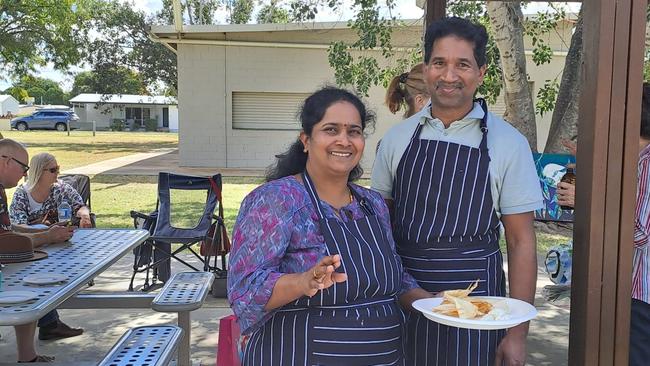
With such a strong love of home cooking, Priya longs, once they own their own property, to plant vegetables such as snake beans, ochre, eggplant, bitter melon as well as chillies, mint and coriander.
She already has containers of various vegetables and herbs on the go. In her future backyard there will also be chickens. And perhaps a pet dog.
But it might just be the small, everyday things that the family and their friends savour the most – Nades attending a Father’s Day celebration in Tharnicaa’s prep class; Fredericks running into Priya while grocery shopping; Kopika and Tharnicaa dancing in the school musical production of The Little Mermaid; Priya and Nades sitting with other parents in the school’s assembly hall; and Kopika’s school artwork of her future self as a doctor in medical scrubs because “she wants to help people’’.
“For four years, it is a dream to come back to Bilo,’’ Priya says.
“I have many friends in Bilo, I finally relax, I breathe and I can have a good sleep. In detention, I never sleep – sometimes five days no sleep – I worry, too much thinking. When Tharnicaa was sick, my mind was totally lost. Now, my family is safe. I look forward to living in Bilo my whole life.’’
Nades and Priya came to Australia separately, arriving by boat in 2012 and 2013 respectively.
The Sri Lankan civil war, between the Liberation Tigers of Tamil Eelam (LTTE, also known as the Tamil Tigers, a rebel group that fought to establish an independent state in the north and east of the country) and the Sri Lanka military, was fought from 1983 to 2009. The Tamil Tigers were defeated in 2009.
Priya has spoken of her fear and trauma experienced in Sri Lanka – of watching her then-fiance being burnt alive; of being raped; her father being assaulted and losing sight in one eye; her mother being physically and sexually assaulted; her home bombed.
She fled to India in 2001 where Tamil refugees often faced exploitation, harassment and assault. She endured dangerous conditions for 12 years before fleeing to Australia in 2013 when she feared she would be forced back to Sri Lanka.
Nades fled Sri Lanka in 2012 fearing persecution “from both sides’’ for his history of fighting (against his will) for LTTE and his later conscription in the government army during the civil war.
In Australia, both Priya, who arrived by boat at the remote Australian territory of the Cocos Islands, 2750km northwest of Perth, and Nades, who arrived by boat at Christmas Island, 2605km northwest of Perth, were classified as “illegal maritime arrivals’’ and were released into the community on bridging visas.
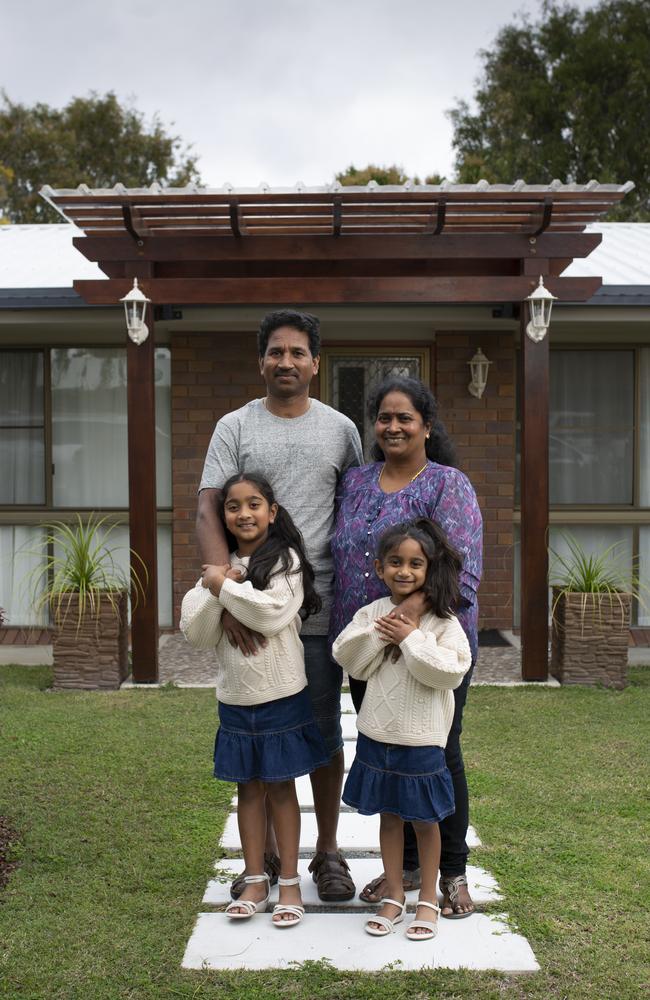
They met and married in Sydney, with their union arranged through the Tamil community. They then moved to Biloela – the largest town in Central Queensland’s Banana Shire – where they legalised their traditional Tamil wedding at the Biloela Court House in September 2014.
They welcomed their daughter Kopika in 2015 and then Tharnicaa in 2017.
Nades worked at the meatworks; Priya attended church-based playgroups with her daughters and became known for her curries. The town welcomed the family who paid their own way and did everything they could to integrate.
After her distressing history of violence and fear, Priya would tell her friends her life began when she arrived in Biloela, the only place that truly felt like her home. For more than four years – 18 months in immigration detention in Melbourne and almost two years on Christmas Island and 12 months of community detention in Perth – she became depressed, was unable to sleep and worried endlessly about the future fate of her daughters and husband should they be forced to live in Sri Lanka.
In time, the family will look to buy their own piece of the Australian dream – their own house and block of land in Bilo.
The last of the nine Home to Bilo fundraisers was the only one solely for the family, with the aim to raise $148,000 to replace Nade’s lost wages during his years in detention. This target was surpassed with $214,527 raised and so $60,000 is being donated to local and national causes supporting other asylum seekers. The money the family received has been used to buy a car, for the girls’ schooling and, most likely, for a house deposit.
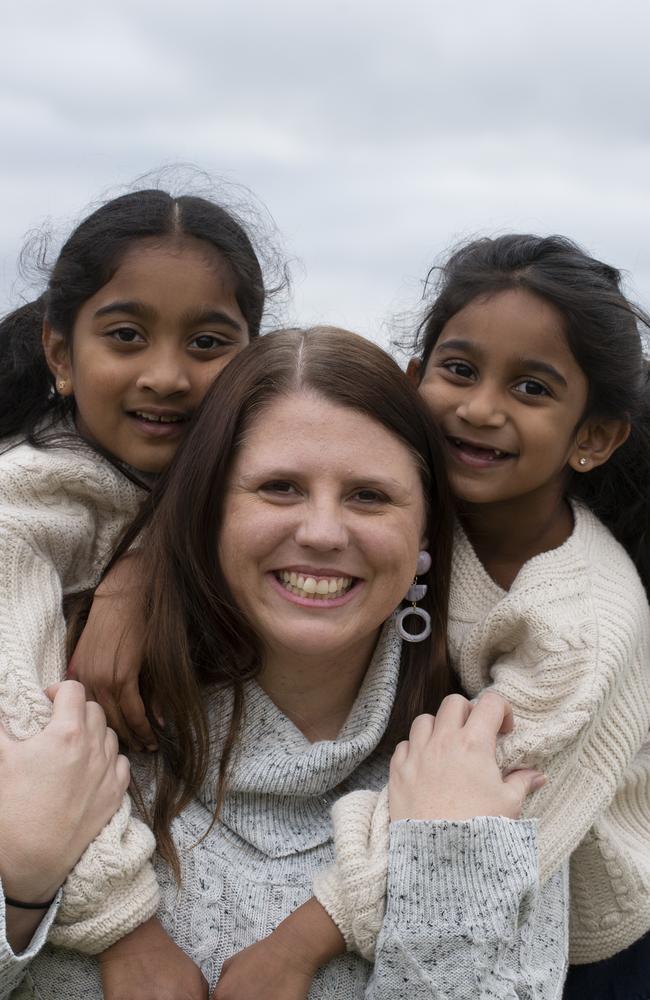
Fredericks, 34, is one of several key supporters and advocates for the family and “face’’ of their campaign. She has visited them in every place of their detention and loves the family as her own. Her parents, Anne and John Smith, who also live in the town, regard Kopika and Tharnicaa as their grandchildren, with the girls calling them “Nan’’ and “Pop’’.
Anne, 70, a retired schoolteacher has begun piano lessons with the girls and is also keen to do extra literacy lessons and reading with them.
“There were so many times when we thought all was lost. To have them here now is a dream come true,’’ Fredericks says.
“It was one of those moments when we realised just how huge this Home to Bilo army was. It was a moment of realising the joy this story has brought to people. And for me, it gave me so much hope about where Australia is heading.’’
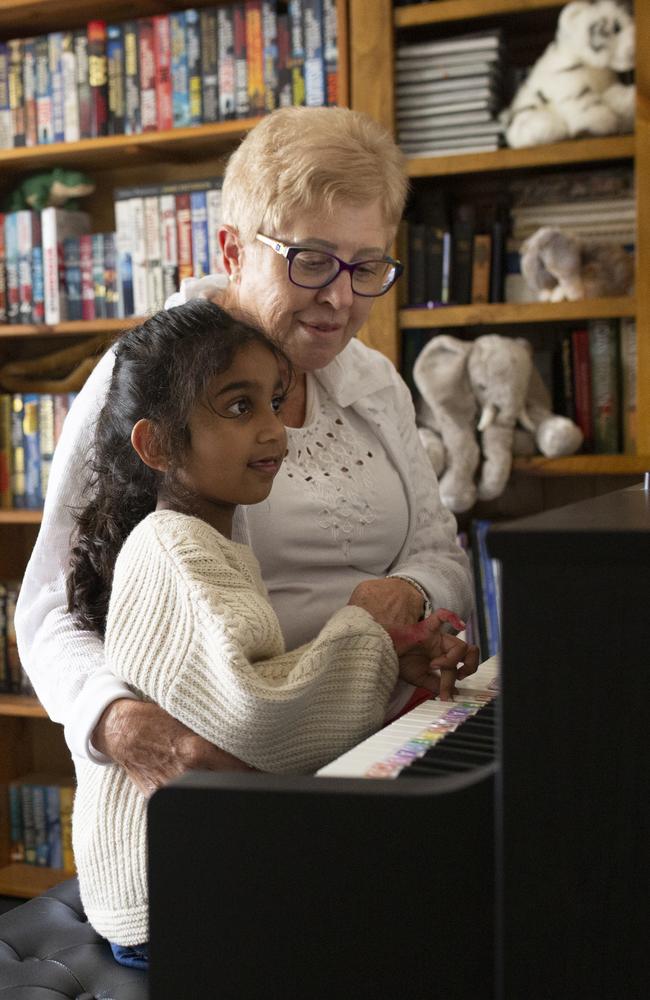
Another key family supporter is Bronwyn Dendle, 47, a social worker for Central Queensland Rural Health, who says it has been heartening to see the Biloela community welcome them home. Dendle often describes Priya, Nades and the girls as “our family’’.
“It has been a long road. I didn’t really understand what asylum seekers went through in this country and I can’t now un-know what I know,’’ she says.
“During the campaign, I heard from a lot of people that there must be something the government knows that we don’t know. My response would always be that I know this family and I know their story and anyone who knows the truth supports them.
“I’m really hopeful that Priya and Nades’ story has awakened people to what we do to asylum seekers and how wrong that is. Their story has shown people what asylum seekers look like in a community – it gives them a face and a personality. It takes away the power of the narrative that says they are terrorists or bad people or bad for our country.
“We hope this shines a really big light on how our asylum-seeker politics works and prepares the ground for change in general in Australia.’’
Immigration lawyer and former Biloela resident Simone Cameron, 40, of Toowong in inner Brisbane, met Nades in her role as a migrant English teacher in the town.
Teaching Nades and other men who had come to Australia by sea inspired her career change into law, struck by their stories of war and tragedy, their decisions to flee their homelands in search of safety but then being “punished at every turn’’ by Australia‘s immigration policy.
Cameron left Biloela, volunteering and working in the refugee sector for a few years in Sydney and Melbourne before studying law. She had just started her first subject of a Bachelor of Laws in March 2018 when the family was removed from Biloela and placed in detention.
“For much of the past four years, it seemed like an unwinnable battle,’’ Cameron, who was heavily involved with the Home to Bilo campaign, says.
“But that persistence, led by Nades and Priya, and followed by the rest of us, paid off. And I feel like that is something that will stay with me forever.’’
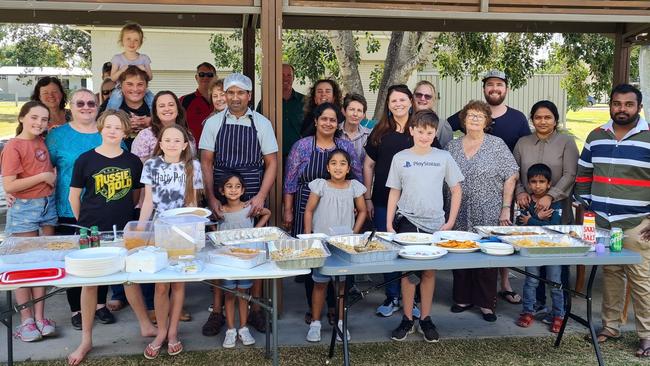
The Home to Bilo supporter group has achieved its goal but, conversely, now feels like the work is just beginning. Their joy is tinged with guilt that many others like this family are still facing uncertainty.
They now hope their experience might be used by others and that its success may be replicated again and again – one small country town, one family at a time. Fredericks says they are keen to “get behind’’ existing groups such as the Tamil Refugee Council, Rural Australians for Refugees and Mums 4 Refugees.
“We started this knowing absolutely nothing and we were successful,’’ Cameron says.
“We’ve learnt so much along this journey that we do feel that sense of responsibility now that our eyes have been opened. We can’t stop, we have to keep giving a voice to those that don’t have a voice.”
At its heart, the Home to Bilo campaign is a win for people power. The Nadesalingam family are home in Bilo today because of crowd-funding that allowed the family and their supporters to fight the federal government with legal appeals that went all the way to the High Court of Australia.
“At the end of the day, it did take a change of government, however we had to keep them here for four years for that to happen and that was due to people power,’’ Fredericks says.
And the letters of support and gifts from everyday Australians still come. Dendle says “it happens a lot’’ that grey nomads divert through Biloela on their way back to the southern states so they can drop off gifts to the family.
“There are birthday cards, Christmas cards, support letters,’’ Priya says.
“They are good words, lots of good messages. All the time in detention, in my mind, were negative things. But reading the cards, my mind was positive.
“In the future, my girls will see all the people that send these cards.
“When they grow up, they can see how much support we had to come back to Bilo. One day, I will explain everything to them.’’




